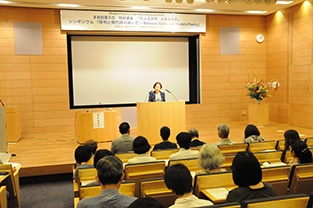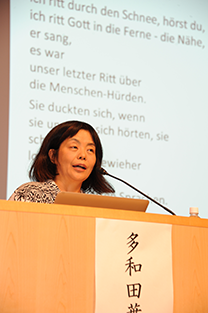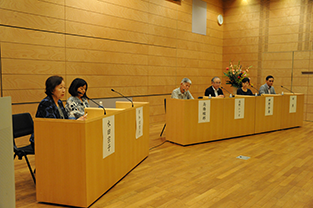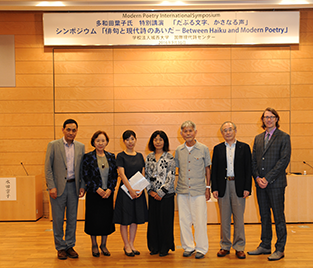- HOME >
- NEWS >
- Modern Poetry International Symposium II・Modern Poetry International Symposium 'Between Haiku and Modern Poetry'


On September 16, 2016, Josai University Educational Corporation (Chancellor, Noriko Mizuta) held the Modern Poetry International Symposium 'Between Haiku and Modern Poetry' at the Tokyo Kioichio Campus Building 1 Hall. Sponsored by the university's International Modern Poetry Center, and supported by Shichosha. In addition to the special lecture by Akutagawa Prize winning poet Ms. Yoko Tawada, a round table discussion was held between celebrated Haiku poets and poets on the front line of Japans poetry world about the expanse of expressions that are abundant in Haiku and modern poetry. Approximately 160 participants including Haiku poets, poets, writers, and members of the public came to listen to the interestingly themed symposium.
In December of last year, the university founded the International Contemporary Poetry Center within the corporate headquarters, in commemoration of its 50th anniversary. With the aim to serve as the hub of critical research, translation, and appreciation of modern and contemporary poetry both in Japan and worldwide, the centre holds symposiums or open dialogues on poetry, tripartite discussions, and public readings. This year marks the 5th year since the Tohoku earthquake and tsunami, and Haiku poets and poets who composed pieces about the 3/11 disaster held a round table discussion and poem recitals at an event titled 'Unruly Cradle; Poetic Responses to the 3/11 Disaster'. On July 1st, the Modern Poetry International Symposium 'Poetry and Childhood' was held between modern contemporary poets from Japan and China, where they had round table discussions and poetry readings.
Chancellor Mizuta explained the symposium's theme in her opening remarks, "The influence of the haiku on Western poetry is huge. I always wanted to investigate the space of expressions between the haiku and western poetry." Ms Tawada was introduced as follows, "Ms Tawada has developed ways of expression through the interaction of different genres, countries and languages. We are thrilled to have him give a lecture today."

Chancellor Mizuta gives her opening remarks in front of many participants

Ms. Tawada gives her lecture
At the start of her lecture, titled 'Doubled Letters, Overlapping Voices,' Ms. Tawada presented 'Like a Senryu' (by Ms. Tawada), a poem which makes use of linguistics, grammar and language, and received cheerful laughter and applause from the crowd. Ms. Tawada spoke about the diverse languages of poetry by using German poems as an example. She also spoke about Japanese hiragana and kanji; "Kanji gives an abstract atmosphere, and it makes your feet stop for a moment. In contrast, hiragana allows for a smooth flow. With the combination of stops and flows, a visual rhythm is created."
At the symposium, Mutsuo Takahashi (poet), Mutsuo Takano (Haiku poet), Saki Kouno (poet), Tian Yuan (poet, translator, Josai International University Visiting Professor) went on stage. Chairman Mizuta who is a scholar of comparative literature and a poet took the role of commentator with Ms. Tawada. Mr. Takahashi stated that: "the core of Japan's literary history is the history of songs. A history where the long became short. Haiku is the most advanced state-of-the-art poetry". Mr. Takano has said that the rapid ageing of the leaders of Haiku makes him 'concerned about the future of Haiku', but he also said 'I think a new style of Haiku will develop now, because Haiku poets, while having a complex against modern poetry, were always conscious about the form of words after the war.' Ms. Kouno said, "My direct feelings are that modern poetry is very musical. Modern Haiku, which before received visual stimuli, should this time be able to receive the essence of modern poetry, which records down in words the sounds, tunes and voices. Lastly, Mr. Tian said, "As opposed to the Haiku which has become an international genre, Chinese poetry is not the same. Chinese is an exclusive language, while Japanese is an inclusive language."
In response to the four people's remarks, Ms. Tawada commented, "I feel that novels can learn a lot from Haikus, such as their fixed form." Chairman Mizuta said, "Isn't it the case that modern poetry and Haikus have in some ways been built and survived together as a genre?"
|
Mr. Takahashi gives a speech |
Mr. Takano gives a speech |
|
Ms. Kouno gives a speech |
Mr. Tian gives a speech |

A view of the symposium

Commemorative photograph taken by a participant
The International Contemporary Poetry Center, in collaboration with Sweden "Cikada Award", will hold the second round Cikada Award Commemoration Symposium on November 18th (Fri) at the Tokyo Kioicho Campus, 1st building. We look forward to welcoming many participants.
